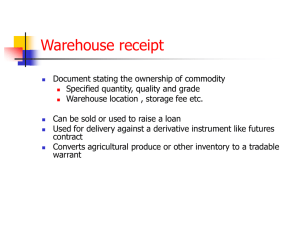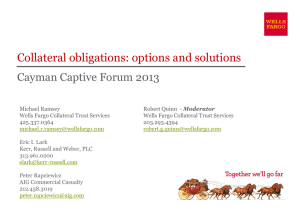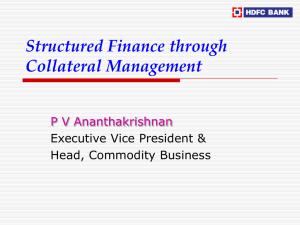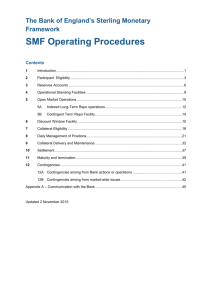Pinsent Masons WG Slides
advertisement
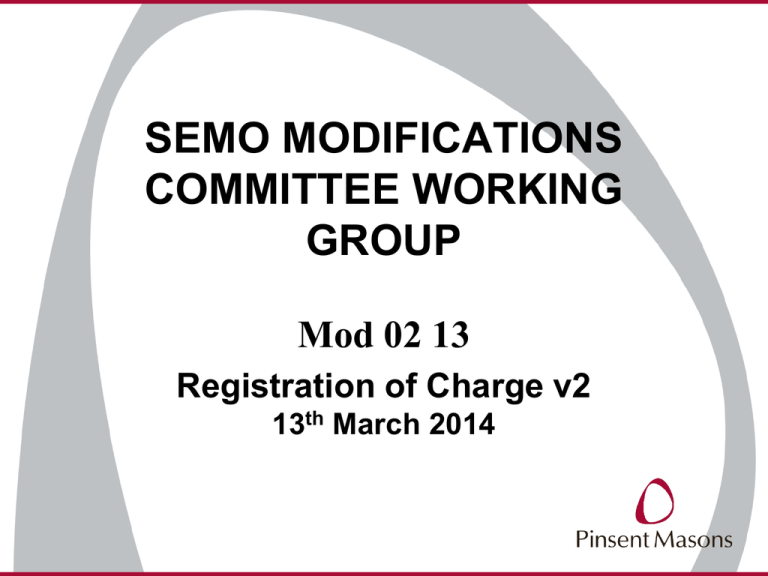
SEMO MODIFICATIONS COMMITTEE WORKING GROUP Mod 02 13 Registration of Charge v2 13th March 2014 Trust Provisions under the Trading & Settlement Code •Sections 6.30 – 6.38 of the Code •Trust Language - slightly misleading •Two interpretations: Analysis 1 & 2 ANALYSIS 1 Figure 1 CODE WORDING Section 6.30 – 6.38 CONSTRUCTIVE TRUST Trustee: Market Operator Beneficiaries: Participants (A, B, C, etc.) DOES THIS ARRANGEMENT CONSTITUTE A SECURITY INTEREST: ANALYSIS 1 YES Smith (as Administrator of Cosslett (Contractors) Ltd) v Bridgend County Borough Council [2001] National Westminster Bank plc v Spectrum Plus Limited [2005] (fixed v floating charge) IS THIS SECURITY INTEREST REGISTERABLE OR IS IT EXEMPT UNDER THE REGULATIONS: THE REGULATIONS (Financial Collateral Arrangements (No 2) Regulations 2003 (SI 2003/3226)) (as amended) Gray v G-T-P Group Ltd (Re F3G Realisations Ltd) [2010] Re Lehman Brothers International (Europe) (in administration) [2012] ANALYSIS 1 CHARGE IS REQUIRED AND IT NEEDS TO BE REGISTERED ANALYSIS 1 CONSTRUCTIVE TRUST • over the monies deposited in the Collateral Reserve Accounts SECURITY INTEREST • Deposit Account Scenario • Rights of Market Operator ANALYSIS 1 CONSTRUCTIVE TRUST: • Trustee = Market Operator (‘MO’) • (Potential) Beneficiaries = >>Participants >>SEM Creditors >>Market Operator ANALYSIS 1 CONSTRUCTIVE TRUST: • Why constructive? • Trusts arise in circumstances as set out in the Code (per s.6.30). • No clearly identifiable trust fund prior to the occurrence of certain events which are set out in s.6.32. ANALYSIS 1 • Trust Property = contingent interest arising in the Collateral Reserve Accounts • Legal Title is vested in the MO • The Participants can give a charge over their equitable interest in the Collateral Reserve Accounts ANALYSIS 1 SECURITY INTEREST: • Arrangements between the parties • MO rights of set-off and deduction • MO appropriation & application rights give rise to security interest over the Participants’ interest in the credit balances ANALYSIS 1 Smith (as Administrator of Cosslett (Contractors) Ltd) v Bridgend County Borough Council [2001] • Bridgend Council advanced £1.8m to Cosslett Ltd to purchase plants and machinery for producing coal. Repayment to the Council was from sums Cosslett would otherwise have been paid for the coal production; • Contract stated the Council could complete the contract if Cosslett abandoned it and condition 63 gave Council the right to enter the plant, sell it and the machinery, and apply the proceeds of sale to satisfy the sums owed on foot of the contract. • Cosslett went into administration and abandoned the contract. The Council appointed another company to complete the works and sold the plant and machinery • Administrator sued the Council for damages for conversion of the plant and machinery (as the Council could no longer deliver up same) • Argued that Condition 63 amounted to an unregistered floating charge which was therefore void for lack of registration. ANALYSIS 1 SMITH: • Court held that a creditor's contractual right to sell debtor assets and appropriate the proceeds of sale and apply them in satisfaction of payment obligations, amounted to a charge which was void for lack of registration. This supports the analysis that: • a security interest arises under the Code provisions; and • it needs to be registered or it will be void against an administrator / liquidator ANALYSIS 1 Intention to create a security interest: • s.6.20.3: "the relevant Participant thereby charges all sums paid into and accruing on that account by way of first fixed charge over cash at the SEM Bank in favour of the Market Operator as agent and trustee for it and the SEM Creditors to secure the relevant Participant's payment obligations under the code, subject always to the provisions of paragraphs 6.32 to 6.36 inclusive" ANALYSIS 1 Intention to create a security interest: • s.6.21 "to ensure the enforceability of the charge created…the Participant…shall complete and sign the particulars of charge in respect of such SEM Collateral Reserve Account and SEM Collateral Reserve Assets for registration of the charge with the relevant companies registry or other appropriate body…and the Participant shall do all such things and execute all such documents as necessary to facilitate such registrations" ANALYSIS 1 Does the security interest created by s.6.30-6.38 constitute a Floating vs. Fixed Charge? • National Westminster Bank plc v Spectrum Plus Limited and others [2005] • House of Lords held that determining whether a charge over book debts takes effect as a floating rather than fixed charge will mainly depend on the degree of control that the chargor has in respect of the secured assets. ANALYSIS 1 Applying Spectrum Plus: Market Operator has a hybrid role • Collateral Reserve Accounts in sole name of MO BUT • MO does not have absolute title; and • Participants have right to deal with monies in the Collateral Reserve Accounts, provided that certain conditions are satisfied (6.35). ANALYSIS 1 Applying Spectrum Plus: Rights of participants per 6.35 Provided that the participant is not in default: • the MO must transfer quarterly interest to the Participant unless they request otherwise • if the Participant so requires, the MO must transfer any excess credit cover in the Collateral Reserve Accounts to the Participant ANALYSIS 1 Applying Spectrum Plus: Rights of participants per 6.35 (continued) Provided that the participant is not in default: • the Participant can change the composition of its Posted Credit Cover by, for example, substituting cash collateral with a Letter of Credit; • upon request of the Participant, the MO must transfer from the Accounts an amount specified by the Participant in order to make payment against an outstanding invoice. ANALYSIS 1 Applying Spectrum Plus: • Participant has a degree of control • Therefore, per Spectrum Plus, the charge over the Participant's beneficial interest in the Accounts = FLOATING not fixed. ANALYSIS 1 Is this floating charge exempt from registration? Consider: • Financial Collateral Arrangements (No.2) Regulations 2003 (SI 2003/3226) (the 'Regs'). • Does the security = a ‘security financial collateral arrangement‘? • If yes = exemption from requirement to register with Companies House ANALYSIS 1 Is this floating charge exempt from registration? Consider: • Gray and others v G-T-P Group Limited: Re F2G Realisations Limited (in liquidation) [2010] • Charge arose in the context of a trust over a bank account. • For Regs to apply collateral must be ‘in the possession or under the control’ of the collateral-taker • Meaning of ‘in the possession or under the control’ not defined in the Regs or the European Directive implemented by the Regs ANALYSIS 1 GRAY: Court considered meaning of 'control‘: • concept of 'control' construed very narrowly • high degree of 'legal control' required for a floating charge to qualify as a 'security financial collateral arrangement' • administrative or practical control over collateral will not be sufficient ANALYSIS 1 GRAY: Court considered meaning of 'control‘ (continued): • can the collateral-taker prevent the collateral-provider from dealing with the collateral? ‘dispossession' • legal right to the secured assets must be removed from the collateral-provider - right of a collateral-provider to, for example, withdraw collateral is inconsistent with this requirement ANALYSIS 1 Is the floating charge exempt from registration? No, in our view the charge created by the trust arrangements under the Code does not fall within the scope of the Regulations (and thus would not be exempted from the registration requirement) ANALYSIS 1 Amended Regulations, 2010: • 'possession' can include rights of the collateralprovider to substitute financial collateral of the same value or to withdraw excess collateral • BUT no clarification in relation to definition of ‘control’ ANALYSIS 1 • Still much ambiguity in respect of ambit of Financial Collateral Regulations • Financial Markets Law Committee recommended further clarifications on the meaning of ‘possession’ and ‘control’ (Jan 2013) • Little judicial authority • new UK registration regime (6 April 2013) introduced voluntary registration - any charge created by a company 'may' be registered • Therefore, prudent practice to register ANY charge, even if it may on the face of it fall within the scope of the Regs ANALYSIS 1 • Charge created by the trust arrangements under the Code must be registered to avoid the security interest being void against an administrator or liquidator • A supplemental and standalone charge document reflecting the security interests created by the trust arrangements is required for registration purposes ANALYSIS 2 Figure 2 CODE WORDING Section 6.30 – 6.38 CONSTRUCTIVE TRUST: AGENCY RELATIONSHIP (in accordance with the contractual obligations between the parties) ANALYSIS 2 WOULD THIS CONTRACTUAL ARRANGEMENT BE ROBUST ENOUGH TO SURVIVE THE APPOINTMENT OF A LIQUIDATOR? NO Agency relationship will be terminated per Sowman v David Samuel Trust Ltd [1978]. YES Agency relationship is terminated by liquidation BUT a Power of Attorney will survive. POWER OF ATTORNEY IS REQUIRED* AMENDMENTS TO T&S CODE ARE REQUIRED NO NEED TO REGISTER AT COMPANIES HOUSE *Power of attorney 'by way of security' (s.4 Powers of Attorney Act 1971 and s.3 Powers of Attorney (NI) Act 1971). ANALYSIS 2 S.6.30-6.38 of the Code Contractual arrangement results in an AGENCY RELATIONSHIP: • MO is the agent of the Participants • clear contractual agreement between the parties empower MO to administer the Accounts, make deductions, etc. ANALYSIS 2 S.6.30-6.38 of the Code • Contractual matrix constitutes an arrangement under which the MO can enforce its rights • Would this contractual arrangement survive the insolvency of a Participant? ANALYSIS 2 • Participant liquidation / administration? • Contractual arrangements will not be sufficiently robust • Sowman v D Samuel Trust Limited [1978] ANALYSIS 2 Sowman: • Following the winding up of a company, a receiver of a company (as deemed agent of the company) was subject to termination (in the event of liquidation) • on the facts, the ‘attorneyship’ survived as given ‘by way of security’ and it was irrevocable • 'a winding up or liquidation of a company will put an end to the agency, it will not put an end in any way to the powers of a receiver' ANALYSIS 2 Power of Attorney 'by way of security' (s.3 Powers of Attorney (Northern Ireland) Act 1971) • given by a Participant in favour of the MO in respect of its interest in the Collateral Reserve Accounts • gives the MO the right to fully deal with and administer the Collateral Reserve Accounts as the attorney of the Participants in accordance with the trust arrangements under the Code • In the circumstances such attorneyship by way of security would be irrevocable on the appointment of an administrator or liquidator ANALYSIS 2 EQUITABLE RIGHT OF SET-OFF? • It was suggested in Smith, above, that even though the charge over the debtor's assets was void for lack of registration, surely the contractual obligations between the parties gave rise to an equitable right of set-off between the parties, which allowed the creditor to set-off payments owed by the debtor on foot of the agreed terms between the parties ANALYSIS 2 EQUITABLE RIGHT OF SET-OFF? • Court disagreed with this analysis stating that if permitted this would simply allow the exercise of rights which should have been registered as a charge and dismissed this argument as an indirect attempt to avoid the consequences of non-registration CONCLUSION • Analysis 1 is the most ‘true’ interpretation of the Code provisions • It reflects the spirit of the Code & the drafters’ intentions • It provides certainty to the MO and to Participants • It is the safest approach QUESTIONS? Pinsent Masons LLP is a limited liability partnership registered in England & Wales (registered number: OC333653) authorised and regulated by the Solicitors Regulation Authority, and by the appropriate regulatory body in the other jurisdictions in which it operates. The word ‘partner’, used in relation to the LLP, refers to a member of the LLP or an employee or consultant of the LLP or any affiliated firm of equivalent standing. A list of the members of the LLP, and of those non-members who are designated as partners, is displayed at the LLP’s registered office: 30 Crown Place, London EC2A 4ES, United Kingdom. We use 'Pinsent Masons' to refer to Pinsent Masons LLP, its subsidiaries and any affiliates which it or its partners operate as separate businesses for regulatory or other reasons. Reference to 'Pinsent Masons' is to Pinsent Masons LLP and/or one or more of those subsidiaries or affiliates as the context requires. © Pinsent Masons LLP 2014 For a full list of our locations around the globe please visit our websites: www.pinsentmasons.com www.Out-Law.com

